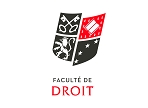FORMATIONS |
Fiche détaillée d'un cours
 | Public international Law - Cours magistral | ||
2023-2024 | FrFaculté de Droit - Lille et Issy-les-Moulineaux
(
FLD
)
| ||
Code Cours : | 2324-FDL-ITLAW-EN-2003 | ||
| Niveau | Année de formation | Période | Langue d'enseignement |
|---|---|---|---|
| S3 | FrAnglais |
| Professeur(s) responsable(s) | Alessandro Chechi |
|---|---|
| Intervenant(s) | Pas d'autre intervenant |
- Ce cours apparaît dans les formations suivantes :
- Faculté de Droit Lille - Licence 2 Européenne de Droit - S3 - 2 ECTS
Pré requis
This is an introductory course in Public International Law designed primarily for students who have not previously studied the subject. Nevertheless, students can attend this course if they have a good understanding of English.
Objectifs du cours
The course considers a number of key inter-related questions: what is international law and why does it matter? Is it “really law”? To whom does it apply? Where are the rules of this legal order to be found? How are they enforced?
Contenu du cours
CLASS 1 - Introduction.
Notion, nature and historical evolution of international law.
CLASSES 2-3 Subjects of International Law.
States as the primary subjects of international law; international legal personality; criteria of statehood; sovereignty; territory; jurisdiction. Recognition of States and Governments; State succession. The principle of self-determination. Other international legal subjects: national liberation movements; insurgents; de facto regimes.
CLASSES 4-5 – Sources of International Law.
Article 38 ICJ Statute: customary international law; peremptory norms of international law (jus cogens) and erga omnes obligations; general principles of law; judicial decisions; writings of publicists; other possible sources, including the acts of International Organisations; the 1969 Vienna Convention on the Law of Treaties (VCLT); treaty-making; reservations; interpretation; validity; termination and suspension; relationship between customary law and treaties. The relationship between international law and municipal law; the implementation of international law within domestic legal systems; the role of “national legal operators”.
CLASSES 6-7 - International law in practice: the prohibition of the use of force and immunities of States and of International Organisations.
The prohibition of the threat or use of force under the UN Charter; the right to self-defence; the fight against terrorism; the use of force to prevent or curtail humanitarian catastrophes; the United Nations Collective Security System. Diplomatic Relations and Treatment of Foreigners: diplomatic privileges and immunities; consular relations; an introduction to diplomatic protection and the treatment of foreigners. State immunity: evolution and justification; the immunity of Heads of State and other State officials: evolution and justification; intersection with the protection of human rights. Immunity of International Organizations: theory and practice; intersections with the protection of human rights; immunity of the agents of International Organizations and of the UN.
Modalités d'enseignement
Organisation du cours
Tutorials: written tests (2) - oral presentations - participation (50% of the final grade).
Final exam: 3 hours (50% of the final grade).
Lectures with case studies to be discussed by students.
Méthodes pédagogiques
Évaluation
Examen : coeff. 1
Bibliographie
• Henriksen Anders, International Law, Oxford University Press, 2017., • Kaczorowska A., Public International Law, 4th ed., Routledge, 2010., • Shaw M., International Law, 7th ed., Cambridge University Press, 2014., • Thirlaway H., The Sources of International Law, Oxford University Press, 2014.
Ressources internet
International Court of Justice (ICJ) and Permanent Court of International Justice: <http://www.icj-cij.org/docket/index.php?p1=3>
* Informations non contractuelles et pouvant être soumises à modification


















































































